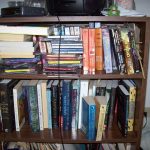I spent a lot of yesterday reading various things about publishing, marketing books, etc., and I had a big “Aha!” moment that led to a hypothesis that I now need to test.
One of the books talked about having an “ideal reader,” the hypothetical person you write your books for. There will obviously be outliers who don’t fit the profile, but this is the core readership you’re targeting. This is the person you have in mind when you write, so that you’re writing books that appeal to this person, and this is the person you target in your marketing efforts. One way of testing whether you’re doing this the right way is by looking at the “also boughts” for your books on Amazon. Are these books that you think your ideal reader would also be interested in? If not, you may have problems because the people who bought those books are going to be the ones Amazon will promote your books to.
My “also boughts” are kind of weird. Aside from my own books, there’s a bit of contemporary fantasy, then there are the cozy paranormal mysteries with cartoony covers, and then there are a lot of vampire and shifter romances. I can see there being some crossover, but generally, people who are into sexy vampire and shifter romances probably aren’t going to find what they’re looking for from my books. But then I remembered that my publisher keeps promoting Enchanted, Inc. as paranormal romance. Whenever they do a BookBub, that’s the category they put it in (no matter how many times I beg them not to). The number of people who buy the book during a BookBub has probably totally skewed things. The cozy paranormal mystery thing may be more organic. There’s likely some crossover with the paranormal romance market, but I think that readership is also drawn to my books because there’s a “case” in each book while the relationships develop over the course of the series, and like a cozy mystery, there’s no graphic sex or violence.
But this doesn’t really fit my “ideal reader.” When I started writing Enchanted, Inc., it was essentially for people like me, adults who enjoyed the Harry Potter books but wanted something like that for and about grown-ups, applying the magical whimsy of the Harry Potter universe to the adult world of work, with bad bosses, office politics, and office romances.
Digging deeper into that, and considering the readers I’ve met or talked to, I would say that my target ideal reader is probably a woman (95 percent of my author Facebook page followers are women) who’s a big reader, but not necessarily a hard-core fantasy fan. She really loves the Harry Potter universe (either read the books as an adult or was a teen fan who’s now grown up) and wants more stuff like that, but has a hard time finding it. She’s probably also a Disney fan, both of the animated movies and the live-action remakes. She may like romance in books, but her tastes tend more toward Jane Austen than the kind of thing generally sold as “romance.” She’s possibly more likely to read YA fantasy than adult fantasy because she’s not so into the heavy, grim stuff. Normal life is stressful enough! She’s more concerned with a world she enjoys visiting than in the intricacies of worldbuilding, and the characters are the most important part.
That doesn’t mean that other readers aren’t welcome, just that this is the center of the Venn diagram of all the various types of readers, and it’s who I tend to write for. Now I just need to find a way to reach this reader. When we were launching the first Enchanted, Inc. book, I tried to convince my publisher to go after the adult fans of Harry Potter, especially since one of those books was coming out a month or so after my book. They told me, “We want people writing about you, not writing about Harry Potter,” and I told them no one was going to be writing about me, but they would be writing about Harry Potter, and if I got included in that, it would give me a boost. I did go a little rogue and sent a review copy to a local reporter who was writing about Harry Potter, and I did end up getting an article about “What moms can read while waiting for their kids to finish the new Harry Potter book,” so it might have worked on a broader scale. I also sent a review copy to one of the big Harry Potter fan sites that also did reviews of books their fans might like. But I’m not sure my “ideal reader” is someone who’s that kind of fan. She probably doesn’t have a lot of time for “fandom.” She just reads things she enjoys. She may buy some merchandise, but probably isn’t spending time on fan sites.
So, how close does my “ideal reader” come to hitting the mark? Does this sound anything like you or someone you know? Of course, the fact that you’re reading my blog probably puts you deeper into “fandom” than the majority of people who read my books, so that’s going to skew any feedback.

